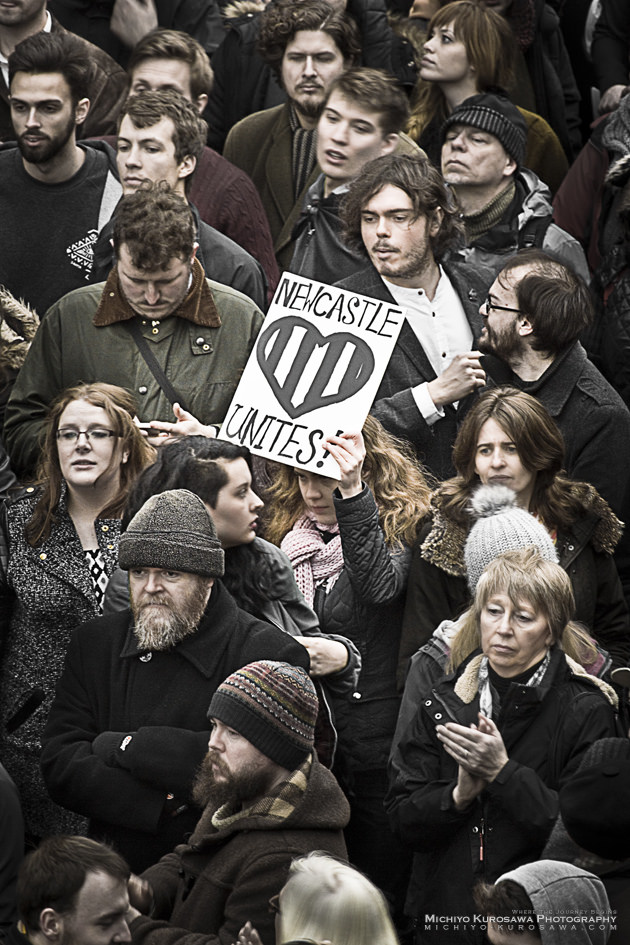Can this generation continue the north east’s history of tolerance to “outsiders” and bring warmth and reason to the debate about refugees? Gabriel Moreno-Esparza and Lee Barron believe it can
Our region enjoys a rich tradition of welcoming migrants from a wide range of countries. The area has witnessed significant influxes of migrants, such as the period between 1880 and 1920 when people arrived from Scotland, Ireland, and, significantly, from Yemen. A distinctive community grew in the coastal town of South Shields, thanks to the Yemeni sailors who settled there from the 1890s – the first significant Muslim community to settle in the UK. It wasn’t always harmonious – race and prejudice played a part in violence that erupted on the town’s streets in 1919 and 1930. But such incidents were rare and the community became an important part of the culture of the town, marked most famously by the visit of Muhammad Ali in 1977 to the Laygate mosque to have his wedding blessed.
As historian Dave Renton has pointed out, South Shields has “always been a seafaring community accustomed to and hospitable to strangers. The town has also absorbed numbers of Scandinavians, Latvians, Poles and Estonians. Making their home in the town today are people from almost every country in the world.”
Perhaps our history and culture of shipbuilding nurtured a cosmopolitan outlook that has helped make people across the north east more tolerant when it comes to cultural diversity. Since the turn of this century, the city of Newcastle for example has welcomed communities from Kurdistan, Afghanistan, Russia, Turkey, Somali, Czechoslovakia, and Croatia… to name but a few.
That attitude towards newcomers was evident earlier this year, when the Newcastle branch of Unite rallied 2,000 supporters in a counter-demonstration that eclipsed Britain’s first anti-Islam Pegida march. Local press were united in characterising Newcastle as “a city united against hate”.
Has this generally tolerant north east mindset been applied to the refugee crisis of recent weeks? To gain some sense of this, we have been collecting the headlines of local newspapers – Chronicle, Journal and Northern Echo – published between the beginning of June, (around the time when developments in Calais began promoting serious debate in this country), and the second week of September.
In contrast to previous analysis of national newspapers conducted in early August, we have detected a consistent pro-refugee frame. North east headlines have frequently expressed views such as “We must see them as human beings”, “calls for convoy of love”, “do your bit to help in refugee crisis”, and “we should be helping, not building walls” alongside criticisms of the “defiant” attitude of David Cameron and the government on the issue of migration.
Of course, this is no proof that everyone in the north east shares such a tolerant mindset. As the Chronicle reported early this month, “Our readers are divided over response to escalating crisis”, even though its report contained more voices in favour of helping refugees.
And it’s not too difficult to find the spectre of division in other spheres of expression. Participants in a discussion thread on social media platform Streetlife.com that began with a comment about the stabbing of a 42 year-old man in Gosforth quickly spiralled into contention about whether the UK government should be helping British citizens, as opposed to refugees fleeing their war-torn homes.
The challenge for this generation in the north east will be to demonstrate itself capable of passing on the tolerance and compassion it has inherited to the next.
Gabriel Moreno-Esparza is lecturer in journalism and Lee Barron is principal lecturer in the Department of Media and Communication Design, both at Northumbria University.
Tell us your views in the comments section below – by clicking on the little speech bubble.
(Views expressed on our website and in our magazines and emails are not necessarily endorsed by The Northern Correspondent.)

